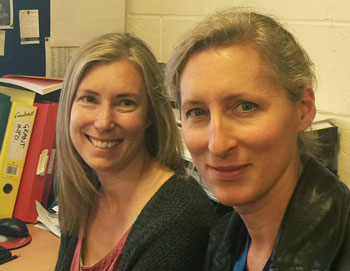|
|
Dramatic improvements in mood and anxiety, weight and digestive symptoms with a 4-week gut-friendly diet |

Foodsmatter researcher, Kate Lawrence (seen here with nutritional therapist Jeanette Hyde) has just published a small-scale preliminary study exploring the influence of a dietary manipulation on physical and emotional wellbeing. The results were very encouraging.
People following a gut bacteria restoration diet for one month showed dramatic improvements in weight, mood, cognition, and digestive symptoms. The 21 participants in the study followed a dietary protocol, designed by Jeannette, for four weeks. The dietary protocol is 100 per cent based on food. It targets the composition of gut bacteria (the microbiome) by bombarding the body with a massive range of fresh vegetables, fresh herbs, fruit and extra virgin olive oil each day, to feed friendly bacteria in the gut. It also restricts processed high grain carbohydrate foods, sugar and artificial sweeteners which may disrupt gut bacteria. After a fortnight, daily servings of fermented foods are introduced, such as kefir or sauerkraut, to plant friendly bacteria in the gut too. The diet also includes a 12-hour overnight fast enabling the microbiome to replenish overnight and allow a spell of time for good bacteria to bloom.
There is increasing evidence that the trillions of bacteria (both friendly and not so friendly) that populate our gut can influence our health; for example, by interacting with our immune system and excreting hormones and neurotransmitters. Weight loss was welcomed by many participants. Gut bacteria are thought to influence weight by sending signals to the brain to tell us when we are full and also by influencing how many calories we extract from the food we eat. We are seeing increasing interest in the use of non-drug interventions, such as diet and exercise, to treat a variety of health problems. TV shows, such as BBC1’s Doctor in the House with Dr Rangan Chaterjee, provide exciting anecdotal evidence of the dramatic health benefits of simple lifestyle and dietary changes. We believe it is of prime importance that dietary interventions be evidence-based, with solid research behind them, to give them the credibility needed to bring them into main stream medical practice. We hope that the publication of our findings will act as a catalyst for more research into the benefits of dietary manipulations of the microbiome. We are currently planning more extensive randomised-controlled-trials using this protocol. This intervention has the potential to improve physical and emotional wellbeing in the general population and also to be investigated as a treatment option for individuals with conditions as diverse as IBS, anxiety, depression and Alzheimer’s disease. The treatment may be especially useful for people having side-effects from the drugs commonly used to treat these conditions. June 2017 |












